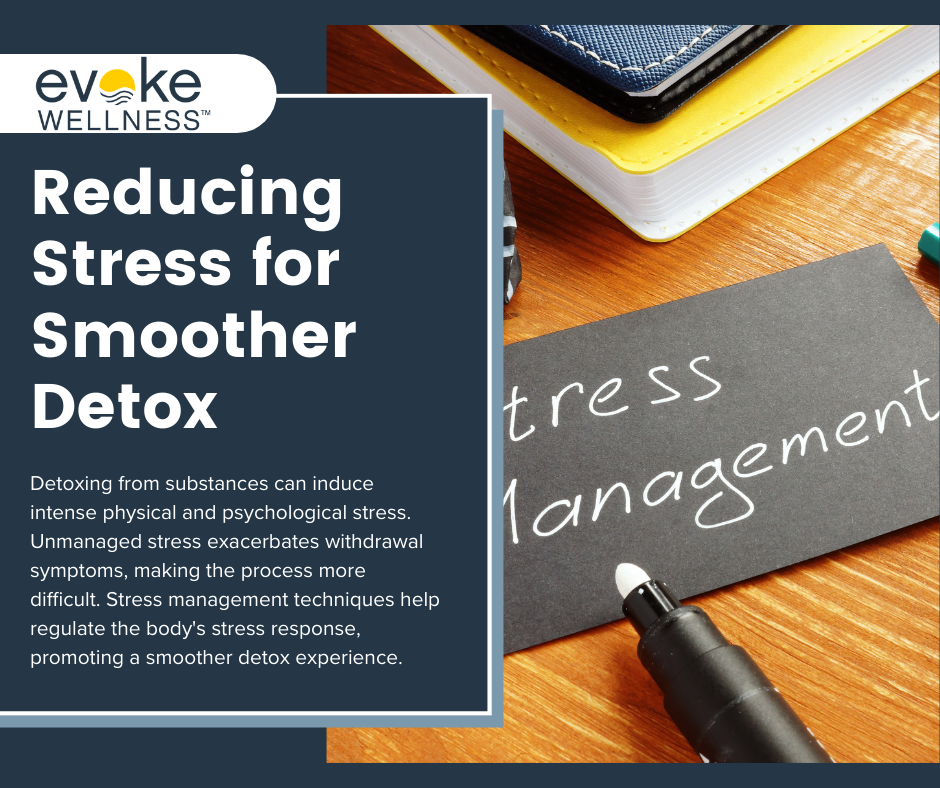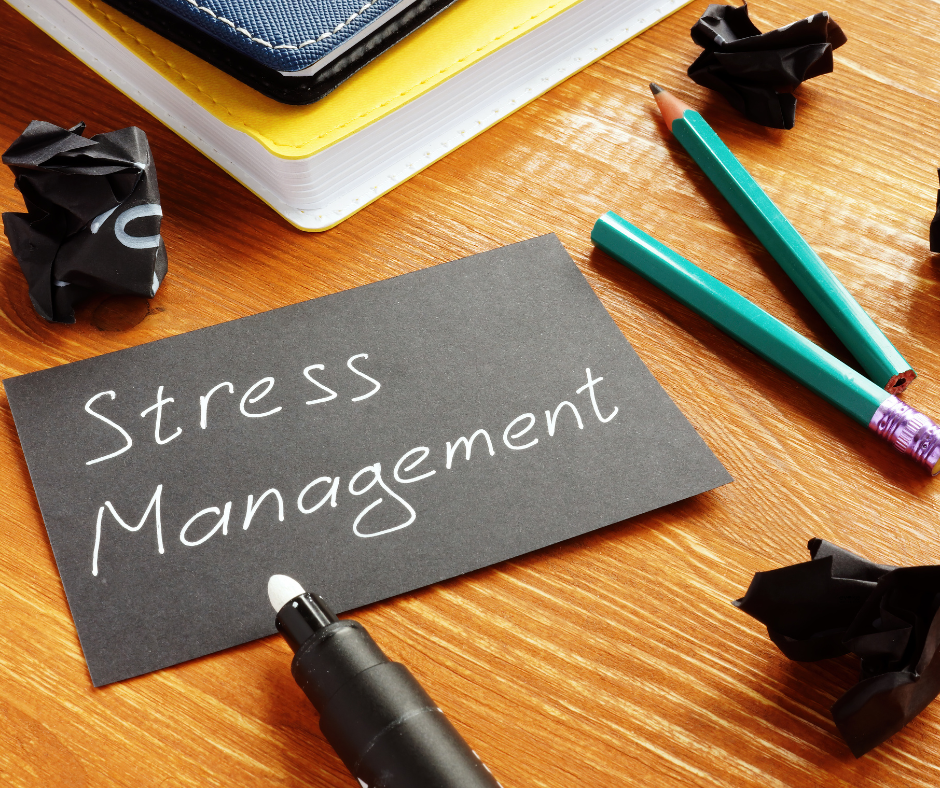As you embark on your journey to recovery, managing stress is crucial for achieving optimal detox outcomes. Recent studies show that individuals who incorporate stress management techniques are 40% more likely to complete detox successfully. At Evoke Wellness at Hilliard, we understand the intricate connection between stress and addiction.
By addressing stress through these evidence-based interventions, you’ll be better equipped to navigate the challenges of detox and lay a strong foundation for long-term recovery. Let’s explore how stress management can significantly boost your detox outcomes and set you on the path to lasting wellness.
Together, let’s embrace the journey to recovery and the promise of a new beginning. Call us at (833) 949-1347 today or reach out online.
Understanding the Detox-Stress Link
The Withdrawal Struggle
Detoxing from substances like drugs or alcohol is a grueling process that takes an immense toll, both physically and emotionally. During withdrawal, the brain struggles to regain its delicate chemical balance, unleashing a torrent of psychological side effects like anxiety, irritability, and intense cravings. This emotional upheaval is a normal part of the recovery journey, as the body and mind work to heal from the ravages of addiction.
Stress Compounds the Challenge
Stress plays a significant role in exacerbating these withdrawal symptoms. When individuals experience high levels of stress, it can trigger a cascade of physiological responses that impair the body’s natural detoxification processes. Stress hormones like cortisol can disrupt the liver’s ability to metabolize and eliminate toxins effectively, further prolonging the detox period and intensifying unpleasant side effects.
Mindfulness: A Powerful Ally
Fortunately, mindfulness practices can provide a powerful buffer against the stress of withdrawal. By cultivating a state of present-moment awareness and non-judgmental acceptance, individuals can better navigate the turbulence of detox. Mindfulness-based interventions have been shown to reduce cravings by up to 20% and decrease relapse rates by 30%, equipping individuals with invaluable tools for long-term recovery.
Comprehensive Care for Lasting Recovery
While managing stress is crucial during detox, it’s equally important to address the underlying emotional and psychological factors that contribute to addiction. Comprehensive treatment programs that integrate evidence-based therapies, counseling, and holistic approaches can provide a solid foundation for lasting recovery, empowering individuals to overcome the challenges of detox and build a life of sustained sobriety.
The Benefits of Effective Stress Management
Mastering stress management techniques offers profound benefits that can significantly enhance your detox journey and overall well-being. As highlighted by recent studies, regular exercise promotes the release of endorphins, alleviating stress and anxiety while flushing out toxins through perspiration.
Improved Physical and Mental Well-being
Effective stress management fosters a state of mental clarity and focus, enabling you to approach challenges with a calm, centered mindset. This heightened awareness allows for better decision-making and increased resilience, crucial elements for maintaining sobriety. According to experts, up to 80% of individuals undergoing detox experience significant physical symptoms, making stress management an essential component of a successful recovery plan.
Enhanced Ability to Focus on Recovery
By mitigating the impact of stress, you can direct your energy towards the recovery process more effectively. Culturally sensitive detox programs incorporate mindfulness practices, counseling, and holistic therapies, empowering you to actively engage in your healing journey. This personalized approach fosters a supportive environment conducive to long-term recovery.
Reduced Risk of Relapse
Unmanaged stress can trigger cravings and increase the likelihood of relapse. Effective stress management strategies, such as mindfulness meditation and cognitive-behavioral therapies like Dialectical Behavior Therapy (DBT), can help regulate emotions, enhance distress tolerance, and promote healthier coping mechanisms. By addressing the underlying emotional and psychological factors contributing to addiction, you can significantly reduce the risk of relapse and maintain lasting sobriety.
Practical Strategies for Stress Management
Mindful Breathing Exercises
Mindful breathing techniques can help regulate emotions and reduce stress during the detox process. Mindfulness-based interventions like Dialectical Behavior Therapy (DBT) can decrease cravings by up to 20% and lower relapse rates by 30%. Controlled breathing activates the parasympathetic nervous system, promoting a sense of calm.
Physical Activity
Engaging in regular physical activity can serve as a powerful stress-reliever. Exercise releases endorphins, which improve mood and reduce anxiety. Research shows that physical and mental health are interconnected, so incorporating activities like yoga, walking, or strength training can enhance emotional resilience during detox.
Structured Routines
Establishing a structured daily routine can provide a sense of stability and control during the challenging detox period. Implementing a consistent schedule for meals, rest, therapy sessions, and self-care activities can help manage stress and promote a sense of normalcy. This routine can then be carried forward into long-term recovery.
Holistic Therapies
Complementary therapies like art therapy, music therapy, and meditation can be invaluable stress management tools during detox. Holistic healing approaches help individuals process emotions, find creative outlets, and cultivate inner peace – all essential for building resilience.
Developing practical strategies to manage stress is crucial for a successful detox experience and sustained recovery. By combining evidence-based techniques with holistic practices, individuals can build the emotional fortitude needed to overcome addiction.
The Power of Connection and Support
Building a Supportive Network
Navigating the challenges of detox and recovery can be arduous, but a robust support system can make a profound difference. Surround yourself with individuals who understand your journey and provide unwavering encouragement. According to the study by Bain and Company, increasing customer retention rates by 5% increases profits by 25% to 95%. This highlights the transformative power of fostering meaningful connections and maintaining a nurturing environment.
- Seek out support groups or counseling services tailored to your needs.
- Confide in trusted friends or family members who can offer a compassionate ear.
- Explore online communities that foster a sense of belonging and shared understanding.
Embracing Professional Guidance
While personal support networks are invaluable, professional assistance can provide the specialized care and expertise needed during the detox process. According to the study by Bain and Company, increasing customer retention rates by 5% increases profits by 25% to 95%. This underscores the importance of seeking guidance from qualified professionals.
- Consider enrolling in an intensive inpatient treatment program for comprehensive care.
- Engage in therapy programs designed to address underlying mental health concerns.
- Explore anger management treatment programs to develop healthy coping mechanisms.
Celebrating Milestones Together
Commemorating each achievement, no matter how small, can reinforce your commitment and foster a sense of accomplishment. Celebrating milestones and progress can reinforce your loved one’s motivation and momentum in the recovery journey. Involve your support network in these celebrations, creating cherished memories and strengthening the bonds that sustain your journey.
The path to recovery is rarely linear, but by cultivating a strong network of support and seeking professional guidance, you can navigate the challenges with resilience and determination.
Integrating Stress Reduction into Daily Life
Make Mindfulness a Priority
Mindfulness involves cultivating present-moment awareness and a non-judgmental attitude. It can be transformative during recovery by helping you stay grounded, regulate emotions, and build resilience. Mindfulness-based interventions like Dialectical Behavior Therapy (DBT) and Acceptance and Commitment Therapy (ACT) have been shown to reduce cravings by up to 20% and decrease relapse rates by 30%.
Embrace Relaxation Techniques
Mindful breathing, body scans, and mindful movement provide an anchor amidst withdrawal turbulence, allowing you to stay present and accept experiences. Alternative therapies like acupuncture, gentle exercise, and meditation can relieve discomfort by reducing stress, promoting relaxation, and boosting endorphins – supporting both physical and mental detox.
Prioritize Self-Care
Integrating mindfulness into daily activities like exercise, proper nutrition, and hydration can enhance your body’s natural detoxification processes. Physical activity releases endorphins that boost mood while flushing out toxins through sweat. Repetitive exercises induce a meditative state, providing respite from stressors. Prioritizing self-care through a detox lifestyle cultivates increased energy, mental clarity, and overall well-being.
Cultivate Acceptance
Acceptance and Commitment Therapy (ACT) combines mindfulness with cognitive-behavioral therapy, fostering psychological flexibility by teaching acceptance of thoughts and emotions, values identification, and committed action. By embracing acceptance and commitment to personal values, ACT decreases relapse probability and prepares individuals for lasting recovery.
How Stress Management Techniques Improve Detox Outcomes

Techniques like mindfulness meditation, deep breathing exercises, and progressive muscle relaxation can lower cortisol levels and activate the parasympathetic nervous system’s calming effects. This reduces the strain on the body during withdrawal.
Enhancing Detox Effectiveness
Stress directly impacts the brain’s detoxification abilities. Chronic stress impairs the glymphatic system, the brain’s waste removal process. Integrating stress management into detox programs optimizes this system, allowing more efficient expulsion of drug residues and metabolites.
Mindfulness-based techniques also enhance cognitive functioning during detox, improving focus, emotional regulation, and decision-making abilities. This helps individuals stay motivated and engaged throughout the challenging process.
Supporting Long-Term Recovery
Detox lays the foundation for lasting sobriety, but relapse risks remain high without proper coping mechanisms. Stress is a major trigger for relapse, which underscores the importance of developing healthy stress management skills during this critical phase.
Cognitive-behavioral therapy (CBT) and dialectical behavior therapy (DBT) equip individuals with tools to reframe negative thought patterns, manage cravings, and respond adaptively to stressors. Mindfulness practices foster self-awareness and emotional resilience, vital for navigating life’s challenges without turning to substances.
By prioritizing stress management throughout detox and subsequent treatment, comprehensive programs like Evoke Wellness’ intensive inpatient offerings empower clients to achieve sustainable recovery.
FAQs: How Stress Management Techniques Improve Detox
Coping with Withdrawal Symptoms
The detox process can trigger intense physical and psychological withdrawal symptoms like cravings, anxiety, mood swings, and insomnia. Mindfulness techniques like deep breathing, meditation, and present-moment awareness help individuals stay grounded amidst these challenges. Mindfulness interventions can reduce cravings by up to 20% and decrease relapse rates by 30%.
Promoting Emotional Regulation
Detox often brings up powerful emotions that can feel overwhelming. Cognitive-behavioral therapy (CBT) and dialectical behavior therapy (DBT) equip individuals with skills to identify, label, and manage difficult feelings constructively. DBT teaches core skills like distress tolerance, emotion regulation, and interpersonal effectiveness – crucial for coping with withdrawal and building a support system.
Enhancing Brain Recovery
Detox allows the brain to restore neurotransmitter balance, reverse impairment, and promote neuroplasticity – the creation of new neural pathways. Mindfulness practices can physically reshape the brain, increasing gray matter density in areas governing emotional regulation while reducing amygdala reactivity. Managing stress optimizes the brain’s natural detoxification process.
Conclusion
In conclusion, effective stress management is crucial for successful detoxification outcomes. By incorporating techniques like mindfulness, exercise, and cognitive behavioral therapy, you can significantly improve your detox experience and long-term recovery. Recent studies show that stress reduction techniques can decrease relapse rates by up to 30%.
By prioritizing stress management alongside detoxification, you’re setting yourself up for a more successful and sustainable recovery. Take the first step towards a healthier, more balanced life by reaching out to our experienced team today.
Begin Your Journey with Evoke Wellness at Hilliard
If you or a loved one is considering treatment, Evoke Wellness at Hilliard invites you to contact us. Our compassionate team is ready to answer your questions, discuss your needs, and help you take the first steps toward recovery. In Hilliard, you’ll find more than just a treatment program – you’ll discover a community dedicated to your wellness and success. Together, let’s embrace the journey to recovery and the promise of a new beginning. Call us at (833) 949-1347 today or reach out online.


